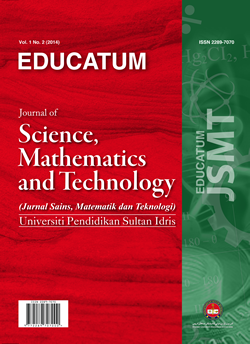The Relationship Between Family Socioeconomic Status and Students' E-Learning Experiences
DOI:
https://doi.org/10.37134/ejsmt.vol12.1.3.2025Keywords:
Socioeconomic status, E-Learning experiences, Mathematics achievementAbstract
The COVID-19 pandemic has had a significant impact on learning processes worldwide. It has been determined that the family's socioeconomic status (SES) is an important factor affecting the learning processes at this time. Students from higher-SES backgrounds usually have more access to educational resources and opportunities. On the other hand, students from lower-SES families are more likely to face problems that can get in the way of their learning. This study examines the effect of parents' educational background on students’ mathematical achievement, the relationship between parents' financial status and students' e-learning experiences, and the influence of parents' financial status on a student's mathematics achievement. For this quantitative study, 100 Form 4 students from SMK Dato Onn were randomly selected to answer 15 survey questions. To achieve the objectives of this study, descriptive and inferential analyses were carried out using the statistical software SPSS. The result showed that uneducated parents significantly impact their children's education, particularly in mathematics. The relationship between parents’ financial status and students’ e-learning experiences is shown to be significant. In addition, there is no influence of parents' financial status on student achievement in mathematics. Students’ academic achievement in mathematics may be influenced by their parent’s financial status, but this is not the only factor. Many factors beyond financial resources can impact student achievement, including school quality, teacher experience, and individual student characteristics.
Downloads
References
Sirin, S. R. (2005). Socioeconomic status and academic achievement: A meta-analytic review of research. Review of Educational Research, 75(3), 417–453. https://doi.org/10.3102/00346543075003417
Toppenberg-Pejcic, D., et al. (2019). Digital divide in the Western Balkans: A cross-country analysis of socioeconomic inequalities in Internet use. Information Development, 35(3), 430–448. https://doi.org/10.1177/0266666917707116
Ministry of Education. (2020). Guidelines for the Implementation of Home-Based Teaching and Learning During the Movement Control Order (MCO) Period. Retrieved from https://www.moe.gov.my/muat-turun/info-terkini/4755-sk-pengajaran-dan-pembelajaran-di-rumah-pdpr-semasa-tempoh-perintah-kawalan-pergerakan-pkp
Lubis, M. A. (2021). Effects of parental socioeconomic status and parents' role in shaping students' learning environment in private primary schools in Indonesia. International Journal of Instruction, 14(2), 265-280. https://doi.org/10.29333/iji.2021.14218a
Zainol, S. S., Hussin, S. M., & Othman, M. S. (2021). Challenges of Online Learning Faced By the B40 Income Parents in Malaysia. International Journal of Education and Pedagogy, 3(2), 45–52.
Karsenti, T., & Collin, S. (2020). The Impact of COVID-19 on the Teaching and Learning of Quebec Students: From Kindergarten to University. Canadian Journal of Learning and Technology, 46(1), 1–5.
Romero, M., López-Cantero, R., & González-Calderón, D. (2020). Home learning during the COVID-19 lockdown: The influence of parents' education on children's study time. Education Economics, 28(4), 365–384.
Warschauer, M., & Matuchniak, T. (2010). New technology and digital worlds: Analyzing evidence of equity in access, use, and outcomes. Review of Research in Education, 34(1), 179-225. https://doi.org/10.3102/0091732X09349791
Van Deursen, A. J., & Helsper, E. J. (2015). The third-level digital divide: Who benefits most from being online? Communication and Information Technologies Annual, 10, 29-52. https://doi.org/10.1108/S2050-206020150000010001
Chen, L., Wang, X., & Jiang, H. (2020). The Impact of COVID-19 Pandemic on Online Learning: Students' Perspective. Journal of Educational Technology Systems, 49(1), 5–22.
Egalite, A. J., Kisida, B., & Winters, M. A. (2015). Representation and enrollment in virtual charter schools. Educational Researcher, 44(2), 112-121.
Davis-Kean, P. E. (2005). The influence of parent education and family income on child achievement: The indirect role of parental expectations and the home environment. Journal of Family Psychology, 19(2), 294–304.
Leung, F. K. S. (2018). Understanding mathematics achievement: A multi-dimensional approach. Frontiers in Psychology, 9, 2514.
Cuisia-Villanueva, M. C., & Núñez, J. (2021). A study on the impact of socioeconomic status on emergency electronic learning during the coronavirus lockdown. NSUWorks. Retrieved from https://nsuworks.nova.edu/fdla-journal/vol6/iss1/6/
Olabiyi, T. D. (2015). The effect of parental socio-economic status on the academic performance of mathematics students. Retrieved from https://doi.org/10.13140/RG.2.2.28158.84802
Taber, K. S. (2018). The use of Cronbach’s alpha when developing and reporting research instruments in science education. Research in Science Education, 48(6), 1273–1296.
Tomul, E., & Savasci, H. S. (2012). Socioeconomic determinants of academic achievement. Educational Assessment, Evaluation, and Accountability, 24(3), 175–187. https://doi.org/10.1007/s11092-012-9149-3
Bhat, M. A., Joshi, J., & Wani, I. A. (2016). Effect of Socio Economic Status on Academic Performance of Secondary School Students. International Journal of Indian Psychology, 3(4), 32-37. https://doi.org/10.25215/0304.004
Idris, M., Hussain, S., & Ahmad, N. (2020). Relationship between Parents' Education and their children's Academic Achievement. Journal of Arts & Social Sciences, 7(2), 82-92. https://doi.org/10.46662/jass-vol7-iss2-2020(82-92)
Yee, K. T., Fitriana, M., Ching, S. S., Govindasamy, V., & Meng, C. H. (2021). Influence of Parental Income and Encouragement on Academic Self-Efficacy and Achievement among Malaysian University Students. International Journal of Education, Psychology and Counseling, 6(44), 81-94. https://doi.org/10.35631/ijepc.644007
Chen, Q., Kong, Y., Gao, W., & Mo, L. (2018). Effects of socioeconomic status, parent-child relationship, and learning motivation on reading ability. Frontiers in Psychology, 9. https://doi.org/10.3389/fpsyg.2018.01297
Downloads
Published
Issue
Section
License
Copyright (c) 2024 Malyanah binti Hai Rul Halim , Suhalia binti Safiai

This work is licensed under a Creative Commons Attribution-NonCommercial-ShareAlike 4.0 International License.





